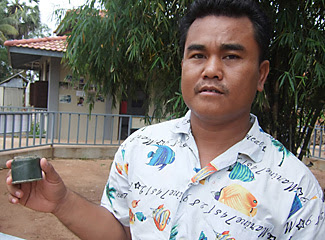.jpg) |
| Aki Ra (Photo: Courtesy of Cambodia Self-Help Demining Organization) |
The U.S. Department of State salutes Aki Ra, founder of Cambodian Self-Help Demining.
10-27-2010
Voice of America
Editorials
Today, Cambodia has one amputee for every 290 people, one of the highest ratios in the world.
The United States Department of State salutes Aki Ra, founder of Cambodian Self-Help Demining, for being named by the Cable News Network, CNN, as one of the Top Ten Heroes for 2010.
Aki Ra, a former Khmer Rouge child soldier, has been clearing mines since 1992, when he received training from United Nations personnel who came to Cambodia to restore peace. In 1993, Aki Ra continued to clear mines on his own, using crude equipment he fashioned himself. In 2005, he went to the United Kingdom to receive formal training and accreditation for demining.
In 2008, Aki Ra formed his own demining organization with former soldiers and war crime victims. Aki Ra has estimated that he and his organization have cleared about 50,000 mines and unexploded munitions, and made safe some 160,000 square meters of land, mainly in the war-troubled area in northwest Cambodia.
Aki Ra, who lost his family during Cambodia’s internal conflicts, was conscripted as a child soldier by the Communist Khmer Rouge regime. The Khmer Rouge was responsible for an estimated 1.5 million Cambodian deaths. Aki Ra recalled that he was about 10 years old when he was given a rifle as tall as he was. For 3 years, Aki Ra worked as a mine layer for the Khmer Rouge. He estimated that he planted as many as 4,000 to 5,000 mines in a month.
The Cambodian Mine Action and Victims Assistance Authority estimated that 4 to 6 million land mines were planted during three decades of conflict. About 63,000 Cambodians have been maimed, and 19,000 were killed. Today, Cambodia has one amputee for every 290 people, one of the highest ratios in the world.
Aki Ra and other Cambodians are working with assistance from many nations in clearing mines. The United States is the world’s leading provider of financial and technical assistance. Worldwide, the United States provides more than $1.8 billion to support humanitarian mine action, contributing toward a dramatic global reduction in casualties. Since 1993, the U.S. Humanitarian Mine Action Program has invested more than $71 million in clearing mines in Cambodia. The United Sates is proud to recognize the work of Aki Ra and other brave men and women in clearing mines in Cambodia.










.jpg)
.jpg)



















